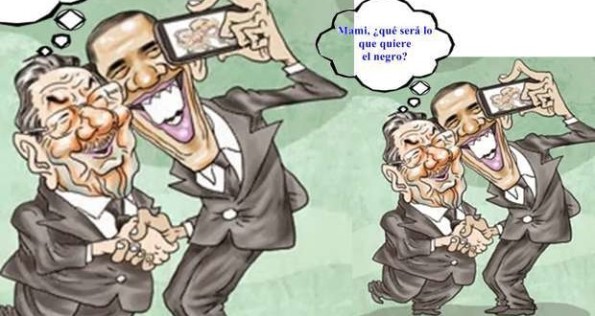Events are moving quickly. At least that is what Nivaldo, a private taxi driver who owns an outdated Moskovich car from the Soviet era, thinks. “Don’t slam the door or it will come loose,” he tells the passengers he drives from Playa to Brotherhood Park in the heart of Havana.
Nivaldo and a large segment of the Cuban population are trying to follow the latest news on emigration and the negotiations taking place in Havana’s main convention center.
“This (the reestablishment of diplomatic relations between Cuba and the United States) has been tremendous,” he says. “Before December 17 the United States was the evil empire and the cause of every malady afflicting the country. The first thing to change was the tone of news coverage. It’s a healthy development that two women are leading the negotiations. Political machismo has caused a lot of harm in Cuba. People are tired of all the testosterone and the testicle-driven rhetoric.”
Nivaldo continues talking as he stops to pick up a passenger. “I don’t know if this new situation will bring immediate improvements in the lives of average Cubans or not. I hope so. I work twelve to fourteen hours a day to support my family and save money to celebrate my daughter’s fifteenth birthday. If things change, maybe I can get rid of this jalopy and buy a new Ford. The question that many on the street are asking is how and in what way will the government implement a series of measures that benefit people,” he says as he raises the radio volume to hear the evening news.
Average Cubans are following events with excessive expectations while some express a die-hard optimism.
Rogelio, an umbrella repairman, is eating a hamburger at a McDonald’s with long lines. “When the embargo is lifted,” he says, “stores will be well-stocked with quality merchandise. I hope the government allows direct imports by the self-employed and the banking system offers more generous credit terms. Stores will allow customers to pay in installments like in any modern society.”
Others are more cautious. “Yes, it’s all well and good to be able to buy rice, chicken and smart phones from the United States, but by necessity the Cuban system must change. There is too much centralization and control, which stifles the economic independence of small private businesses. Then there are the issues of low salaries and the dual currency. How much will the average citizen be able to pay for a home internet connection or an American-made computer?” asks Rosario, an automated systems engineer.
A large segment of the Cuban dissident community considers the strategy adopted by President Obama to be misguided.
At a 2:00 PM press conference announcement on January 23, the prominent opposition figure Antonio Rodiles and a sizable group of dissidents express disapproval of the White House’s recent moves. “I would like to know where they are getting their information,” he says. “I am afraid they have become disoriented. They are betting on a continuation of the Castro regime and are concerned with national security.
“They have undertaken these negotiations without input from the island’s opposition. I don’t see why a regime with a history of political rights violations should change. Obama has given up a lot and gotten very little in return. If the international community does not insist that Cuba ratify United Nation Human Rights Conventions, there will be no change in the status quo. This will translate into the arrests of activists and some opposition figures could end up back in prison.”
There are notable differences in outlook between dissidents and ordinary Cubans. The average person on the street thinks it was time to bring an end to the ongoing political chess game between the two countries.
Cuban citizens believe the new direction in U.S. foreign policy makes perfect sense and pokes through the tired pretexts used by the country’s military overlords to justify the economic catastrophe and ideological madhouse they created fifty-six years ago.
But there is one thing that “black coffee” Cubans and some members of the opposition have in common: each is looking out for its own interests. And the regime knows this. It hopes to perpetuate the system by changing its methods.
President Barack Obama and General Raul Castro are clearly playing in different leagues.
Ivan Garcia
Cartoon from El Legarto Verde.
24 January 2015

